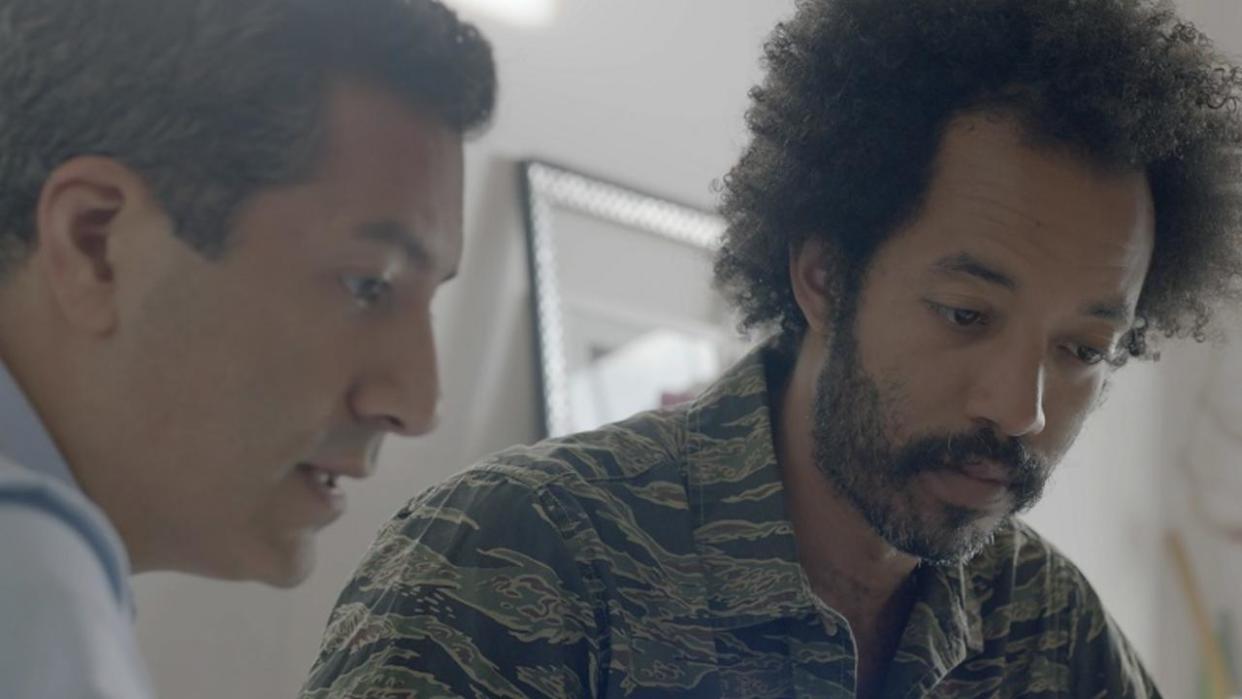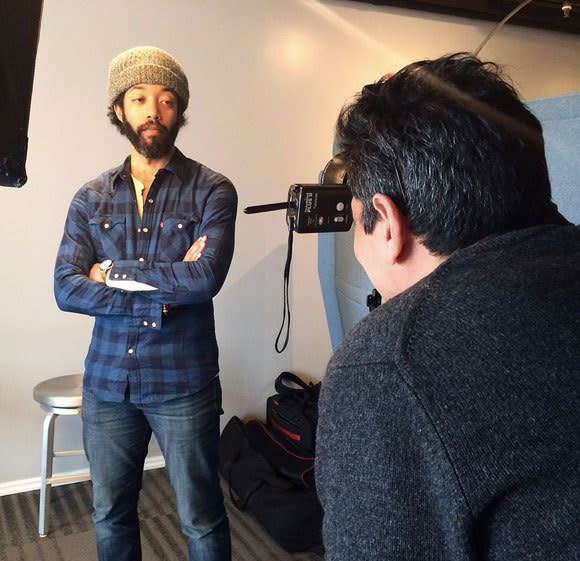Sundance Report: Wyatt Cenac on New Indie 'Jacqueline,' #OscarsSoWhite, and Jon Stewart Reunion

After Wyatt Cenac left The Daily Show With Jon Stewart in 2012, viewers likely assumed the fan favorite would start popping up in Hollywood comedies à la fellow alums Rob Riggle and Kristen Schaal, or perhaps even headlining films like Steve Carell and Ed Helms. That was assuming the 39-year-old Brooklynite wanted to be a movie star. But Cenac never left New York for L.A., has focused on stand-up above acting, and believes if he wants his name above the line, he has to create his own opportunities.
He’ll still field offers, though, and his new project Jacqueline (Argentine) has been one of the best of finds of the Sundance Film Festival. Written and directed by Bernardo Britto (whose 2014 Sundance-winning short Yearbook is essential viewing), Jacqueline is an inspired mockumentary-style indie starring Cenac as an unnamed “director” contacted by the titular low-level French government employee (Camille Rutherford). Jacqueline has taken refuge in South America after happening upon documents outlining plans to assassinate a Middle Eastern politician, and the director documents his journey to Argentina to tell her story. Since the film consists entirely of footage shot by Cenac’s character, we rarely see the actor-comedian in front of the camera, though he does provide a consistent voiceover.
Cenac, who made headlines last summer when he revealed he and Stewart had a falling out at The Daily Show, told us about signing onto Jacqueline, why he’ll never be offered a role in a Marvel movie, and how his appearance on Stewart’s farewell episode wasn’t that big of a deal.
I’d been wondering what you’ve been up to since leaving The Daily Show.
I’ve been wondering what I’ve been up to as well. So I’m glad that this thing panned out.
How’d you get involved with Jacqueline?
Bernardo had thought of me for it, so they reached out. But he showed up to a show of mine, and I had just gotten the script maybe or a day or two before… So we grabbed some drinks and shot the shit for a while. There was a certain amount of passion for the project that he had that… and he seemed like a good dude. That’s the basic criteria for me: Are they cool person, and [does it] seem like a neat idea?
Related: Sundance Report: ‘Southside By You’ Reimagines the Obamas’ Delightful First Date
How much of it had to do with the fact that you got to go to Argentina?
You know, if I actually got to go down to Argentina… I am the one person who didn’t get to go to Argentina.
Was it appealing that you didn’t actually have to be in front of the camera very much?
That was kind of nice. They were like, “We just need you for three days and you’re gonna talk a bunch.” For someone who doesn’t really like to leave his house, that was a perfect situation.
So did you make them come to your house to record that voiceover?
No, no. I don’t let people into my home. That’s cleaning I would have to do.

You weren’t in Argentina, but we’re to think you’re behind the camera the whole time. Did you do any of the actual filming?
There was stuff in Miami where they put the camera on my shoulder and I shot. I think that’s pretty much it. I did get to shoot a little bit of that stuff and learn just how heavy that camera is. It gave me a newfound respect for DPs. “You’re just holding this on your shoulder all day long. Someone needs to get you a masseuse.”
One of the great ironies of this film is that your character has an essential monologue where he that it’s impossible to be original, that all art is derivative. Yet this film feels incredibly original and singular. Do you agree with that sentiment, though?
I think that is one of those things that did resonate with me. Everything feels cyclical. It all feels like new grooves on the same record as far as what we’re doing. It’s not necessarily that anything that is created today is any more groundbreaking than anything that was created 25 years ago or 50 years ago. It’s just that we’re still creating things and there’s uniqueness in the time we’re creating it and why we’re creating it.
Is this the type of film you want to make more of?
I don’t know. I never really think about these opportunities as consistent ones. These have never been a thing that I’ve actively pursued. If these opportunities present themselves and it’s a cool opportunity… any time I do any sort of acting thing it’s kind of like summer camp in that it’s break from what I normally do. So I’ll go off and enjoy it. But I don’t end one film and think, “OK, I’ve gotta find the next one.”
So you don’t actively audition or scout gigs, it’s just a matter of what comes your way?
Not really. I never really got into any of this with the thought that I would be an actor. Whether or it was through my own way of thinking or just what I noticed working in this industry, it’s always felt like anything I was going to do, I was going to have to do myself. Any project I was going to create, I would to write it, I would to have to produce it… Some of that I think is a mentality from having done stand-up so long, but I think just looking at the business side of things I’m not necessarily the person someone’s going to point to and be like, “He needs to be in the Avengers movie.”
Hey, you never know, those Marvel movies can surprise you with funny people in cameos. Folks like Adam Pally and Danny Pudi have popped up unexpectedly.
It’s true. I still don’t think I’d be in an Avengers movie. I think in the laundry list of people they’re looking at for pointless roles in a big-budget action movie, I’m not on there. I’ve also probably s–t on so my many different Marvel projects that I doubt it. My last album I spent a good amount of time s–tting on Marvel’s Agents of S.H.I.E.L.D. I think I’m out of the running.
There’s always DC Comics.
Here’s hoping. Though I might have said something s–tty about Green Arrow, so I could be screwed there, too.
It feels like this whole #OscarsSoWhite kerfuffle is something you would’ve hit on if you were still on The Daily Show. What’s your take?
It’s a strange thing, talking about inclusiveness, when we are sitting in an incredibly exclusive place. But I think that points to the larger with the larger issue with the industry… It’s a problem that you have movies that are getting overlooked. But not just movies featuring black people, movies featuring a lot of minorities. Tangerine is a film that probably should’ve gotten some recognition for what they did. If everyone could talk about Boyhood for being shot over the course of 16, 17 years, why is nobody talking about Tangerine being shot on an iPhone and looking as amazing as it did.
So I think a lot of these things are institutional things. It’s not just the Oscars, it’s indicative of what goes on in the country as well. Yeah, movies are getting overlooked, and the question is why are these movies getting overlooked? What is actually happening in the voting process that allows for these movies to get overlooked? Is there something that is problematic in that? Because every year there’s always some confessions of anonymous Oscar voters, and many of them say, “Oh yeah, I didn’t watch that movie.” So on one level it feels like that invalidates what the purpose of what the awards are.
It feels like that was the case with Straight Outta Compton.
Yeah. So it feels like that invalidates the integrity of the awards and makes them pointless. But at the same time there’s a point to them because as a filmmaker getting an award helps you get another thing made… There’s clearly a narrow focus on how the Oscar voters are going about this, but there’s also a narrow focus on how movies get made, how television gets made, who gets to make those things, who gets to be in the decision-making positions. And all those things need to be addressed.
In a couple months the Oscars will be over, but these problems will still remain. It’s not just black people versus the Oscars. It’s bigger than that. When the Oscars are over, this conversation shoudn’t end. And it also shouldn’t end with the entertainment industry.

Generally are you happy with where you’re at these days? Are you glad you left The Daily Show when you did?
Yeah. I left because the time was right for me to leave. And now it’s just about trying to get the next thing going. Ultimately I’ve always just wanted to make my own things. So it’s trying to get to a place where someone will trust me to do that. I need a lot of co-signers, apparently, to try to get a show made. So it’s trying to get all those co-signers to get people to say, “OK, we’ll take a chance on you. Granted, you have done a lot of s–t. But we still don’t trust it.”
Are you cool with Jon Stewart these days? I think there was a general sense of happiness and maybe relief from fans when they saw you turn up for his last show.
He and I talked about it before. And we talked about it on the day. I’m not a big pomp-and-circumstance guy, I’m not a person who necessarily has a big birthday party or does any of those things. So any conversations that we had are more meaningful than this thing that we do on television, which isn’t necessarily for us. It was a very weird experience. But hopefully people enjoyed it. It was more for the television-watching audience.


